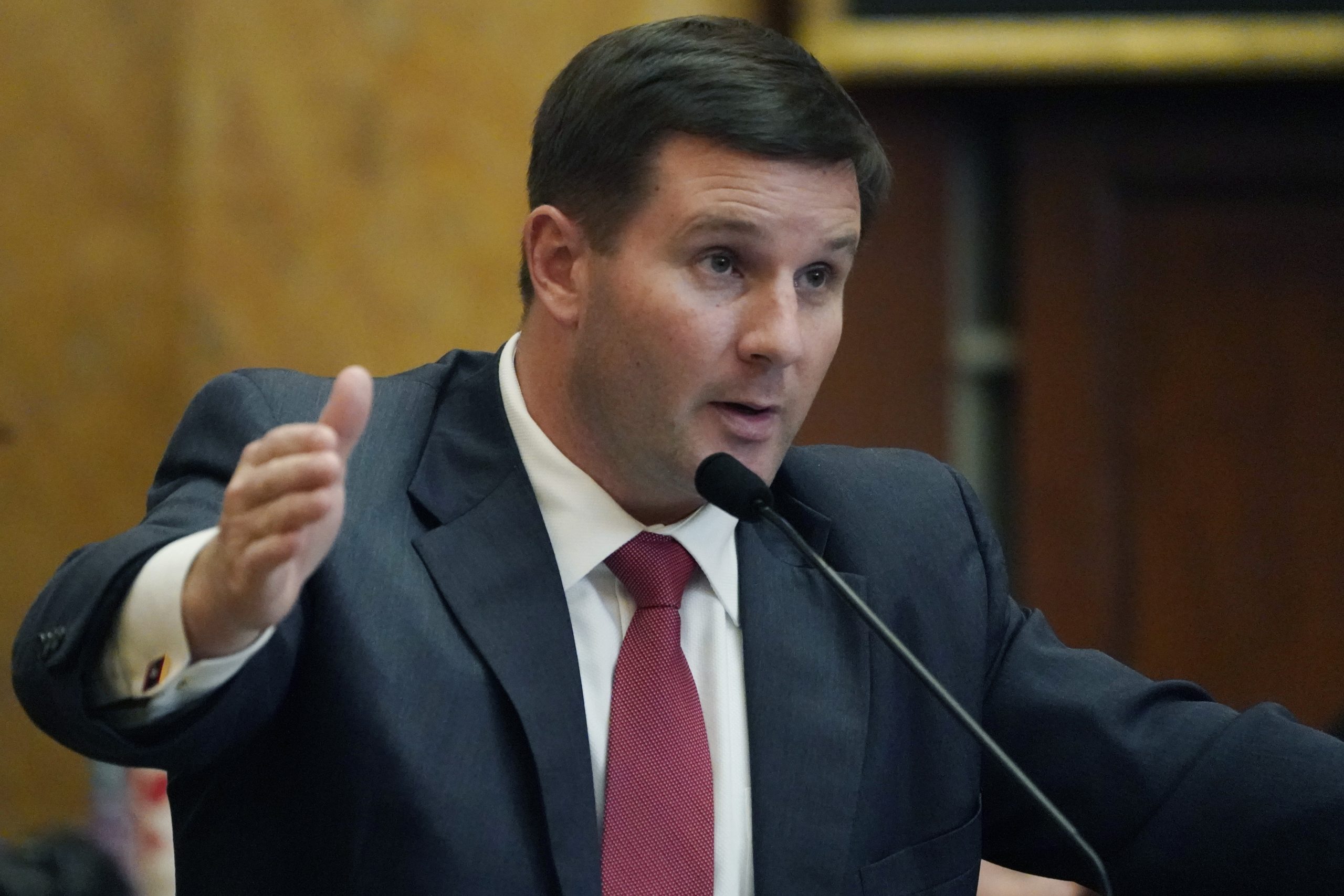Mississippi Today
Does a backlog in Hinds County courts justify appointing five judges? Other counties could be far worse

Does a backlog in Hinds County courts justify appointing five judges? Other counties could be far worse
Lawmakers backing House Bill 1020 say Hinds County’s backlog of cases is an emergency that justifies having five non-elected judges to pick up the slack.
Cliff Johnson, attorney and director of the MacArthur Justice Center, wants to know whether Hinds County really has the worst case backlog in the state. Bill author Rep. Trey Lamar, R-Senatobia, has said the bill is a way to address crime in Jackson and the backlog in the Hinds court system.
“Our conclusion at this point is that the Legislature could not have made the decision to appoint five temporary judges to the Hinds County Circuit Court based on any meaningful analysis of that court’s dockets as compared to the dockets in any other circuit,” Johnson told Mississippi Today.
The center began calculating the number of open criminal cases in each circuit court district between Jan. 1, 2013 and Feb. 26 before realizing Mississippi Electronic Courts — the only public-facing access to case information — doesn’t keep accurate information on pending cases.
Only about half of all counties in the state use MEC. Without data on pending criminal cases, it is difficult to tell if there are case backlogs anywhere and be able to make comparisons, Johnson said.
Hinds County could benefit from additional elected judges, Johnson said, but he couldn’t find the basis to determine the need to appoint five temporary judges — a number that is greater than the number of elected judges.
Legislation passed in 2018 gives the Supreme Court chief justice the ability to appoint temporary judges “in the event of an emergency or overcrowded docket.”
Johnson said it is unclear whether the Senate version of HB 1020 references this law to make temporary appointments or if the bill is a “novel attempt” to appoint judges without determining the existence of an emergency or an overcrowded docket.
The Senate’s Judiciary A Committee passed HB 1020 with multiple changes: the elimination of a proposed separate, unelected judicial district within Jackson and the expansion of the Capitol Complex Improvement District where the Capitol Police operates.
Hinds County, the Seventh Circuit Court District, had 2,508 pending cases, according to MEC data. That is a load of 627 cases each for four judges, according to the data. Over 230,000 people live in the county.
The First Circuit Court District in the northeast part of the state has 8,522 pending cases. That district also has four judges, and its caseload calculated from MEC data is about 2,130 cases per judge.
That district is made up of seven counties and most of the cases came from the largest, Lee County, which had 2,627 pending cases, according to MEC data.
“As we began running reports on criminal dockets, it appeared to us that the backlog in Hinds County was not significantly worse than many other places in Mississippi,” Johnson said. “In fact, our research showed that according to MEC, even a small county like Lee County had more pending criminal cases than Hinds County.”
Staff from the Lee County Circuit Clerk’s Office and circuit court said Wednesday there is no way to know how many open criminal cases there are. Circuit Clerk Camille Roberts Dulaney did not respond to a request for comment.
The state’s Administrative Office of Courts tracks information about disposed cases across the state, but not current criminal cases, Johnson said. The office’s annual report shows disposition numbers for criminal cases and counts during a 10-year period.
Spokesperson Beverly Kraft referred comment about case backlogs to Greg Snowden, director of the Administrative Office of Courts. He did not respond to a request for comment.
Accurate caseload counts are among issues raised about HB 1020, which is seen by many Jacksonians as a takeover of local control.
“This bill would make Mississippi a model for red states with blue capital cities. At its core, this bill is about lawmakers giving themselves the ability to outmaneuver the federal government,” Mayor Chokwe Antar Lumumba said in a statement. “So, by policy or through actually preventing people to vote, it still reflects the poorest version of Mississippi.”
The latest version of HB 1020 also gives the Capitol Police concurrent jurisdiction throughout Jackson and beyond the Capitol Complex Improvement District. It would require the city and the Department of Public Safety to sign a memorandum of understanding.
Lumumba said the memorandum isn’t really an agreement between the two parties, and a spokesperson confirmed he would not sign one.
The bill says failure to execute a memorandum of understanding will not affect Capitol Police’s jurisdiction within Jackson, and any disputes about law enforcement function of Capitol Police in the city would be resolved in favor of the DPS commissioner, who oversees the force.
JXN Undivided, a coalition of community groups such as the People’s Advocacy Institute, One Voice and the Mississippi Center for Justice, is speaking out against HB 1020 and circulating a petition titled “Jackson is NOT for the Taking!”
“What is happening in Jackson, Mississippi, is ruthless,” the petition reads. “It is racist. It is dangerously anti-democratic. And it must stop!”
As of Monday, the petition has received over 1,800 signatures and will be sent to Lt. Gov. Delbert Hosemann, who presides over the Senate, the body that is set to vote on HB 1020.
JXN Undivided also has an open survey for people to share information about their encounters with the Capitol Police, including how officers treated them and how many encounters they have had.
To test how accurate MEC’s case information is, Mississippi Today reached out to the seven circuit court clerks in the First District.
Tishomingo County, the smallest in the circuit court district, has 467 open criminal cases, according to MEC data. It’s a number that Circuit Clerk Josh McNatt said is fairly accurate, but may be “a little over exaggerated” but no more than 5 to 10%.
He has been having conversations with the district attorney, judges and public defenders in the county about how to track case information better.
“I’ve been keeping up with this myself because I’ve been concerned about caseloads,” McNatt said.
This article first appeared on Mississippi Today and is republished here under a Creative Commons license.
Did you miss our previous article…
https://www.biloxinewsevents.com/?p=223444
Mississippi Today
Meet Willye B. White: A Mississippian we should all celebrate
In an interview years and years ago, the late Willye B. White told me in her warm, soothing Delta voice, “A dream without a plan is just a wish. As a young girl, I had a plan.”
She most definitely did have a plan. And she executed said plan, as we shall see.
And I know what many readers are thinking: “Who the heck was Willye B. White?” That, or: “Willye B. White, where have I heard that name before?”
Well, you might have driven an eight-mile, flat-as-a-pancake stretch of U.S. 49E, between Sidon and Greenwood, and seen the marker that says: “Willye B. White Memorial Highway.” Or you might have visited the Olympic Room at the Mississippi Sports Hall of Fame and seen where White was a five-time participant and two-time medalist in the Summer Olympics as a jumper and a sprinter.
If you don’t know who Willye B. White was, you should. Every Mississippian should. So pour yourself a cup of coffee or a glass of iced tea, follow along and prepare to be inspired.
Willye B. White was born on the last day of 1939 in Money, near Greenwood, and was raised by grandparents. As a child, she picked cotton to help feed her family. When she wasn’t picking cotton, she was running, really fast, and jumping, really high and really long distances.
She began competing in high school track and field meets at the age of 10. At age 11, she scored enough points in a high school meet to win the competition all by herself. At age 16, in 1956, she competed in the Summer Olympics at Melbourne, Australia.
Her plan then was simple. The Olympics, on the other side of the world, would take place in November. “I didn’t know much about the Olympics, but I knew that if I made the team and I went to the Olympics, I wouldn’t have to pick cotton that year. I was all for that.”
Just imagine. You are 16 years old, a high school sophomore, a poor Black girl. You are from Money, Mississippi, and you walk into the stadium at the Melbourne Cricket Grounds to compete before a crowd of more than 100,000 strangers nearly 10,000 miles from your home.
She competed in the long jump. She won the silver medal to become the first-ever American to win a medal in that event. And then she came home to segregated Mississippi, to little or no fanfare. This was the year after Emmett Till, a year younger than White, was brutally murdered just a short distance from where she lived.
“I used to sit in those cotton fields and watch the trains go by,” she once told an interviewer. “I knew they were going to some place different, some place into the hills and out of those cotton fields.”
Her grandfather had fought in France in World War I. “He told me about all the places he saw,” White said. “I always wanted to travel and see the places he talked about.”
Travel, she did. In the late 1950s there were two colleges that offered scholarships to young, Black female track and field athletes. One was Tuskegee in Alabama, the other was Tennessee State in Nashville. White chose Tennessee State, she said, “because it was the farthest away from those cotton fields.”
She was getting started on a track and field career that would take her, by her own count, to 150 different countries across the globe. She was the best female long jumper in the U.S. for two decades. She competed in Olympics in Melbourne, Rome, Tokyo, Mexico City and Munich. She would compete on more than 30 U.S. teams in international events. In 1999, Sports Illustrated named her one of the top 100 female athletes of the 20th century.
Chicago became White’s home for most of adulthood. This was long before Olympic athletes were rich, making millions in endorsements and appearance fees. She needed a job, so she became a nurse. Later on, she became an public health administrator as well as a coach. She created the Willye B. White Foundation to help needy children with health and after school care.
In 1982, at age 42, she returned to Mississippi to be inducted into the Mississippi Sports Hall of Fame and was welcomed back to a reception at the Governor’s Mansion by Gov. William Winter, who introduced her during induction ceremonies. Twenty-six years after she won the silver medal at Melbourne, she called being hosted and celebrated by the governor of her home state “the zenith of her career.”
Willye B. White died of pancreatic cancer in a Chicago hospital in 2007. While working on an obituary/column about her, I talked to the late, great Ralph Boston, the three-time Olympic long jump medalist from Laurel. They were Tennessee State and U.S. Olympic teammates. They shared a healthy respect from one another, and Boston clearly enjoyed talking about White.
At one point, Ralph asked me, “Did you know Willye B. had an even more famous high school classmate.”
No, I said, I did not.
“Ever heard of Morgan Freeman?” Ralph said, laughing.
Of course.
“I was with Morgan one time and I asked him if he ever ran track,” Ralph said, already chuckling about what would come next.
“Morgan said he did not run track in high school because he knew if he ran, he’d have to run against Willye B. White, and Morgan said he didn’t want to lose to a girl.”
This article first appeared on Mississippi Today and is republished here under a Creative Commons Attribution-NoDerivatives 4.0 International License.![]()
Mississippi Today
Early voting proposal killed on last day of Mississippi legislative session
Mississippi will remain one of only three states without no-excuse early voting or no-excuse absentee voting.
Senate leaders, on the last day of their regular 2025 session, decided not to send a bill to Gov. Tate Reeves that would have expanded pre-Election Day voting options. The governor has been vocally opposed to early voting in Mississippi, and would likely have vetoed the measure.
The House and Senate this week overwhelmingly voted for legislation that established a watered-down version of early voting. The proposal would have required voters to go to a circuit clerk’s office and verify their identity with a photo ID.
The proposal also listed broad excuses that would have allowed many voters an opportunity to cast early ballots.
The measure passed the House unanimously and the Senate approved it 42-7. However, Sen. Jeff Tate, a Republican from Meridian who strongly opposes early voting, held the bill on a procedural motion.
Senate Elections Chairman Jeremy England chose not to dispose of Tate’s motion on Thursday morning, the last day the Senate was in session. This killed the bill and prevented it from going to the governor.
England, a Republican from Vancleave, told reporters he decided to kill the legislation because he believed some of its language needed tweaking.
The other reality is that Republican Gov. Tate Reeves strongly opposes early voting proposals and even attacked England on social media for advancing the proposal out of the Senate chamber.
England said he received word “through some sources” that Reeves would veto the measure.
“I’m not done working on it, though,” England said.
Although Mississippi does not have no-excuse early voting or no-excuse absentee voting, it does have absentee voting.
To vote by absentee, a voter must meet one of around a dozen legal excuses, such as temporarily living outside of their county or being over 65. Mississippi law doesn’t allow people to vote by absentee purely out of convenience or choice.
Several conservative states, such as Texas, Louisiana, Arkansas and Florida, have an in-person early voting system. The Republican National Committee in 2023 urged Republican voters to cast an early ballot in states that have early voting procedures.
Yet some Republican leaders in Mississippi have ardently opposed early voting legislation over concerns that it undermines election security.
This article first appeared on Mississippi Today and is republished here under a Creative Commons license.
.
Mississippi Today
Mississippi Legislature approves DEI ban after heated debate
Mississippi lawmakers have reached an agreement to ban diversity, equity and inclusion programs and a list of “divisive concepts” from public schools across the state education system, following the lead of numerous other Republican-controlled states and President Donald Trump’s administration.
House and Senate lawmakers approved a compromise bill in votes on Tuesday and Wednesday. It will likely head to Republican Gov. Tate Reeves for his signature after it clears a procedural motion.
The agreement between the Republican-dominated chambers followed hours of heated debate in which Democrats, almost all of whom are Black, excoriated the legislation as a setback in the long struggle to make Mississippi a fairer place for minorities. They also said the bill could bog universities down with costly legal fights and erode academic freedom.
Democratic Rep. Bryant Clark, who seldom addresses the entire House chamber from the podium during debates, rose to speak out against the bill on Tuesday. He is the son of the late Robert Clark, the first Black Mississippian elected to the state Legislature since the 1800s and the first Black Mississippian to serve as speaker pro tempore and preside over the House chamber since Reconstruction.
“We are better than this, and all of you know that we don’t need this with Mississippi history,” Clark said. “We should be the ones that say, ‘listen, we may be from Mississippi, we may have a dark past, but you know what, we’re going to be the first to stand up this time and say there is nothing wrong with DEI.'”
Legislative Republicans argued that the measure — which will apply to all public schools from the K-12 level through universities — will elevate merit in education and remove a list of so-called “divisive concepts” from academic settings. More broadly, conservative critics of DEI say the programs divide people into categories of victims and oppressors and infuse left-wing ideology into campus life.
“We are a diverse state. Nowhere in here are we trying to wipe that out,” said Republican Sen. Tyler McCaughn, one of the bill’s authors. “We’re just trying to change the focus back to that of excellence.”
The House and Senate initially passed proposals that differed in who they would impact, what activities they would regulate and how they aim to reshape the inner workings of the state’s education system. Some House leaders wanted the bill to be “semi-vague” in its language and wanted to create a process for withholding state funds based on complaints that almost anyone could lodge. The Senate wanted to pair a DEI ban with a task force to study inefficiencies in the higher education system, a provision the upper chamber later agreed to scrap.
The concepts that will be rooted out from curricula include the idea that gender identity can be a “subjective sense of self, disconnected from biological reality.” The move reflects another effort to align with the Trump administration, which has declared via executive order that there are only two sexes.
The House and Senate disagreed on how to enforce the measure but ultimately settled on an agreement that would empower students, parents of minor students, faculty members and contractors to sue schools for violating the law.
People could only sue after they go through an internal campus review process and a 25-day period when schools could fix the alleged violation. Republican Rep. Joey Hood, one of the House negotiators, said that was a compromise between the chambers. The House wanted to make it possible for almost anyone to file lawsuits over the DEI ban, while Senate negotiators initially bristled at the idea of fast-tracking internal campus disputes to the legal system.
The House ultimately held firm in its position to create a private cause of action, or the right to sue, but it agreed to give schools the ability to conduct an investigative process and potentially resolve the alleged violation before letting people sue in chancery courts.
“You have to go through the administrative process,” said Republican Sen. Nicole Boyd, one of the bill’s lead authors. “Because the whole idea is that, if there is a violation, the school needs to cure the violation. That’s what the purpose is. It’s not to create litigation, it’s to cure violations.”
If people disagree with the findings from that process, they could also ask the attorney general’s office to sue on their behalf.
Under the new law, Mississippi could withhold state funds from schools that don’t comply. Schools would be required to compile reports on all complaints filed in response to the new law.
Trump promised in his 2024 campaign to eliminate DEI in the federal government. One of the first executive orders he signed did that. Some Mississippi lawmakers introduced bills in the 2024 session to restrict DEI, but the proposals never made it out of committee. With the national headwinds at their backs and several other laws in Republican-led states to use as models, Mississippi lawmakers made plans to introduce anti-DEI legislation.
The policy debate also unfolded amid the early stages of a potential Republican primary matchup in the 2027 governor’s race between State Auditor Shad White and Lt. Gov. Delbert Hosemann. White, who has been one of the state’s loudest advocates for banning DEI, had branded Hosemann in the months before the 2025 session “DEI Delbert,” claiming the Senate leader has stood in the way of DEI restrictions passing the Legislature.
During the first Senate floor debate over the chamber’s DEI legislation during this year’s legislative session, Hosemann seemed to be conscious of these political attacks. He walked over to staff members and asked how many people were watching the debate live on YouTube.
As the DEI debate cleared one of its final hurdles Wednesday afternoon, the House and Senate remained at loggerheads over the state budget amid Republican infighting. It appeared likely the Legislature would end its session Wednesday or Thursday without passing a $7 billion budget to fund state agencies, potentially threatening a government shutdown.
“It is my understanding that we don’t have a budget and will likely leave here without a budget. But this piece of legislation …which I don’t think remedies any of Mississippi’s issues, this has become one of the top priorities that we had to get done,” said Democratic Sen. Rod Hickman. “I just want to say, if we put that much work into everything else we did, Mississippi might be a much better place.”
This article first appeared on Mississippi Today and is republished here under a Creative Commons license.
-

 Mississippi Today4 days ago
Mississippi Today4 days agoPharmacy benefit manager reform likely dead
-

 News from the South - Oklahoma News Feed7 days ago
News from the South - Oklahoma News Feed7 days agoTornado watch, severe thunderstorm warnings issued for Oklahoma
-

 News from the South - Kentucky News Feed5 days ago
News from the South - Kentucky News Feed5 days agoTornado practically rips Bullitt County barn in half with man, several animals inside
-

 News from the South - Alabama News Feed4 days ago
News from the South - Alabama News Feed4 days ago'I think everybody's concerned': Mercedes-Benz plant eyeing impact of imported vehicle tariffs
-

 News from the South - Oklahoma News Feed6 days ago
News from the South - Oklahoma News Feed6 days agoLife of David Boren memorialized in ceremony attended by hundreds
-

 News from the South - Missouri News Feed6 days ago
News from the South - Missouri News Feed6 days agoThunderstorms drench areas south of St. Louis
-

 News from the South - Kentucky News Feed7 days ago
News from the South - Kentucky News Feed7 days agoBowling Green Purples end 2024-2025 campaign as the state runner-up
-

 News from the South - Alabama News Feed5 days ago
News from the South - Alabama News Feed5 days ago41st annual Bloomin Festival Arts and Crafts Fair (April 5 & 6) | March 31, 2025 | News 19 at 9 a.m.














































